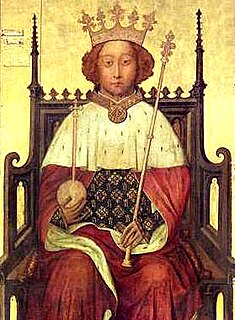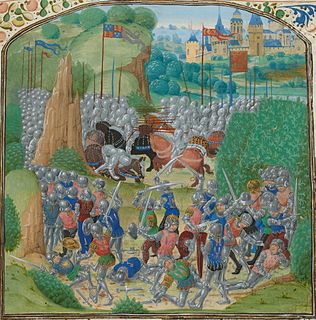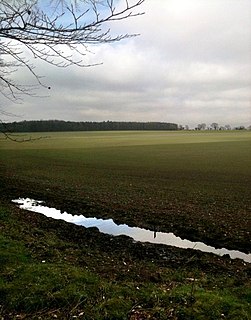This article needs additional citations for verification .(April 2021) |
An important historical document for the reign of Richard II, the chronicle written at Westminster Abbey covers the years from 1381 to 1394. The chronicle is in Latin. [1]
This article needs additional citations for verification .(April 2021) |
An important historical document for the reign of Richard II, the chronicle written at Westminster Abbey covers the years from 1381 to 1394. The chronicle is in Latin. [1]
Year 1465 (MCDLXV) was a common year starting on Tuesday of the Julian calendar.

Richard II, also known as Richard of Bordeaux, was King of England from 1377 until he was deposed in 1399. He was the son of Edward, Prince of Wales, and Joan, Countess of Kent. Richard's father died in 1376, leaving Richard as heir apparent to his grandfather, King Edward III; upon the latter's death, the 10-year-old Richard succeeded to the throne.

Henry IV, also known as Henry Bolingbroke, was King of England from 1399 to 1413. He asserted the claim of his grandfather King Edward III, a maternal grandson of Philip IV of France, to the Kingdom of France. Henry was the first English ruler since the Norman Conquest, over three hundred years prior, whose mother tongue was English rather than French.

Anne of Bohemia, also known as Anne of Luxembourg, was Queen of England as the first wife of King Richard II. A member of the House of Luxembourg, she was the eldest daughter of Charles IV, Holy Roman Emperor and King of Bohemia, and Elizabeth of Pomerania. Her death at the age of 28 was believed to have been caused by plague.
Thomas Walsingham was an English chronicler, and is the source of much of the knowledge of the reigns of Richard II, Henry IV and Henry V, and the careers of John Wycliff and Wat Tyler.

Orderic Vitalis was an English chronicler and Benedictine monk who wrote one of the great contemporary chronicles of 11th- and 12th-century Normandy and Anglo-Norman England. Modern historians view him as a reliable source.

Roger de Mortimer, 4th Earl of March, 6th Earl of Ulster was an English nobleman. He was considered the heir presumptive to King Richard II, his mother's first cousin.
Thomas Usk was appointed the under-sheriff of London by Richard II in 1387. His service in this role was brief and he was hanged in the following year.
Henry Yevele was the most prolific and successful master mason active in late medieval England. The first document relating to him is dated 3 December 1353, when he purchased the freedom of London. In February 1356 he was sufficiently well known as a mason that he was chosen as one of a commission of six cutting masons who were to inform the mayor and aldermen about the acts and articles of the craft.

The Battle of Otterburn took place according to Scottish sources on 5 August 1388, or 19 August according to English sources, as part of the continuing border skirmishes between the Scots and English.

The bishop of London is the ordinary of the Church of England's Diocese of London in the Province of Canterbury.
Isabella of England was the eldest daughter of King Edward III of England and Philippa of Hainault, and the wife of Enguerrand de Coucy, Earl of Bedford, by whom she had two daughters. She was made a Lady of the Garter in 1376.
John Flete was an English monk and ecclesiastical historian who documented the history and abbots of Westminster Abbey.

Robert Henry Charles, was an Irish Anglican theologian, biblical scholar, professor, and translator from Northern Ireland. He is known particularly for his English translations of numerous apocryphal and pseudepigraphal Ancient Hebrew writings, including the Book of Jubilees (1895), the Apocalypse of Baruch (1896), the Ascension of Isaiah (1900), the Book of Enoch (1906), and the Testaments of the Twelve Patriarchs (1908), which have been widely used. He wrote the articles in the eleventh edition of Encyclopædia Britannica (1911) attributed to the initials "R. H. C."
Events from the 1410s in England.

Edward Balliol was a claimant to the Scottish throne during the Second War of Scottish Independence. With English help, he ruled parts of the kingdom from 1332 to 1356.

The Battle of North Walsham was a medieval battle fought on 25 or 26 June 1381, near the town of North Walsham in the English county of Norfolk, in which a large group of rebellious local peasants was confronted by the heavily armed forces of Henry le Despenser, Bishop of Norwich. The battle is significant for being the last occurrence of any major resistance during the English Peasants' Revolt.
Michael Lapidge, FBA is a scholar in the field of Medieval Latin literature, particularly that composed in Anglo-Saxon England during the period 600–1100 AD; he is an emeritus Fellow of Clare College, Cambridge and Fellow of the British Academy, and winner of the 2009 Sir Israel Gollancz Prize.

Ashikaga Yoshimitsu was the third shōgun of the Ashikaga shogunate, ruling from 1368 to 1394 during the Muromachi period of Japan. Yoshimitsu was Ashikaga Yoshiakira's third son but the oldest son to survive, his childhood name being Haruō (春王). Yoshimitsu was appointed shōgun, a hereditary title as head of the military estate, in 1368 at the age of ten; at twenty he was admitted to the imperial court as Acting Grand Counselor.

John Fresshe was a citizen, alderman, and Mayor of London in the latter years of the fourteenth century. A merchant by trade, he was a member of the Mercers' Company, a medieval London trade guild, and has been described as one of London's "leading citizens at the end of the century".